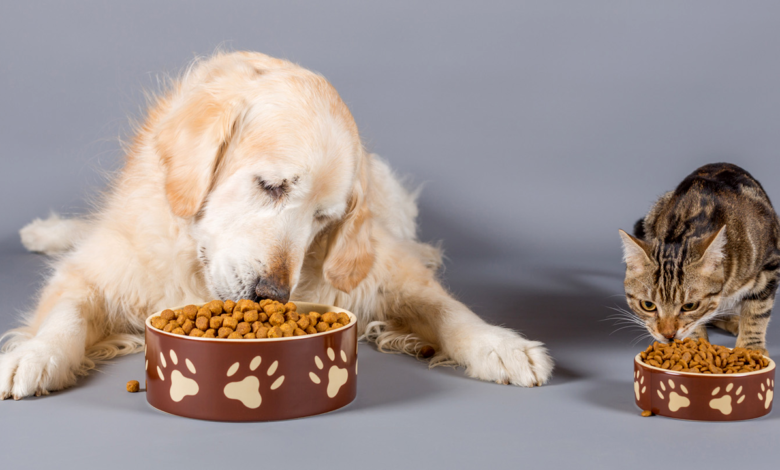
Choosing the Right Pet Food: A Guide for Pet Parents
As a devoted pet parent, ensuring your furry friend’s health and happiness is a top priority. Central to their well-being is providing the right nutrition, and selecting the perfect pet food can be a daunting task amidst the myriad of options available. This comprehensive guide is crafted to empower you with essential knowledge, helping you make informed decisions about your beloved pet’s diet.
Read More: 15 Top USA Pet Food Brands in 2024
Understanding Your Pet’s Nutritional Needs

What Nutrients Do Pets Need?
Much like humans, pets require a balanced diet rich in proteins, carbohydrates, fats, vitamins, and minerals to thrive. Each nutrient plays a vital role in their overall health and vitality, from supporting energy levels to bolstering immune function.
The Importance of a Balanced Diet
A balanced diet isn’t just a buzzword; it’s the cornerstone of your pet’s well-being. Providing a balanced diet ensures they receive all the essential nutrients necessary for growth, development, and sustained health. Without it, pets may face a slew of health issues, including obesity, nutrient deficiencies, and compromised immune function.
Reading Pet Food Labels
Deciphering Ingredients
Navigating pet food labels can feel like deciphering a cryptic code, but it’s essential to understand what goes into your pet’s food. Look for high-quality ingredients like real meat, whole grains, and vegetables, while avoiding artificial additives, fillers, and by-products.
Understanding Guaranteed Analysis
The guaranteed analysis section of pet food labels provides crucial information about the minimum and maximum levels of nutrients in the food. Pay close attention to protein, fat, and fiber content, ensuring they align with your pet’s dietary needs.
Types of Pet Food
Dry Food (Kibble)
Dry food, or kibble, is a popular choice due to its convenience, affordability, and long shelf life. When selecting dry food, opt for high-quality options that meet your pet’s nutritional requirements and preferences.
Wet Food
Wet food, available in cans or pouches, offers higher moisture content and can be more palatable for some pets. Choose options with real meat as the primary ingredient and minimal fillers or additives.
Raw Food Diets
Raw food diets, comprising uncooked meat, bones, and organs, have garnered attention in recent years. While proponents tout their benefits, it’s crucial to consult with a veterinarian to ensure nutritional adequacy and food safety.
Considerations for Special Diets
Grain-Free Diets
Grain-free diets have surged in popularity, but they’re not suitable for all pets. Consult with your veterinarian before making the switch, especially if your pet doesn’t have specific dietary sensitivities.
Limited Ingredient Diets
Limited ingredient diets can be beneficial for pets with food allergies or sensitivities. These diets feature fewer ingredients, making it easier to identify and avoid potential allergens.
Prescription Diets
Prescription diets are formulated to manage specific health conditions, such as obesity, kidney disease, or gastrointestinal issues. They should only be used under the guidance of a veterinarian.
Age-Specific Nutrition
Puppy and Kitten Food
Puppies and kittens have unique nutritional needs for growth and development. Choose high-quality puppy or kitten food tailored to support their rapid growth and provide essential nutrients.
Adult Maintenance Diets
Adult dogs and cats require a balanced diet to maintain optimal health and prevent obesity. Look for adult maintenance diets with appropriate protein and fat levels for your pet’s activity level and age.
Senior Formulas
Senior pets may have special dietary requirements, such as lower calorie or joint support formulas. Consider transitioning to a senior-specific diet as your pet ages to support their changing nutritional needs.
Common Pet Food Additives

Artificial Colors and Flavors
Artificial colors and flavors add no nutritional value and may be harmful to pets. Choose foods with natural ingredients and avoid those with unnecessary additives.
Preservatives
Preservatives are added to pet food to extend shelf life, but some may be linked to health problems. Opt for foods with natural preservatives like vitamin E or vitamin C.
Fillers
Fillers like corn, wheat, and soy are often used to bulk up pet food inexpensively. However, they offer little nutritional value and may contribute to digestive issues or allergies in some pets.
Choosing the Right Brand
Researching Reputable Companies
Do your due diligence and select pet food brands with a proven track record of quality and safety. Look for brands that prioritize sourcing high-quality ingredients from reputable suppliers.
Seeking Recommendations from Veterinarians
Your veterinarian is a valuable resource for pet nutrition advice. Consult with them to tailor your pet’s diet to their individual needs and health status, and don’t hesitate to ask for recommendations on pet food brands.
Budget-Friendly Options
Balancing Quality and Cost
While high-quality pet food may come with a higher price tag, it’s an investment in your pet’s health and longevity. Look for budget-friendly options that still meet your pet’s nutritional needs without compromising on quality.
Finding Coupons and Discounts
Many pet food brands offer coupons, discounts, or loyalty programs to help offset the cost of feeding your pet. Keep an eye out for promotions and savings opportunities when shopping for pet food.
Transitioning to a New Diet
Gradual Introduction
When switching to a new pet food, introduce it gradually over 7-10 days to prevent digestive upset. Mix small amounts of the new food with the old food, gradually increasing the ratio each day.
Monitoring for Digestive Upset
Keep a close eye on your pet for signs of digestive upset, such as vomiting, diarrhea, or changes in appetite or behavior. If any issues arise, consult with your veterinarian for guidance.
Avoiding Common Pitfalls
Overfeeding
Overfeeding can lead to obesity and other health issues in pets. Follow feeding guidelines provided by the pet food manufacturer and monitor your pet’s weight and body condition regularly.
Ignoring Recalls
Stay informed about pet food recalls and take immediate action if your pet’s food is affected. Visit the manufacturer’s website or the FDA’s pet food recall website for up-to-date information on product recalls.
The Role of Water in Pet Nutrition
Importance of Hydration
Water is essential for maintaining proper hydration and supporting vital bodily functions in pets. Ensure your pet has access to fresh, clean water at all times.
Supplementing Dry Food with Water
If your pet primarily eats dry food, consider adding water to their meals to increase moisture content and promote hydration. This can be especially beneficial for pets prone to urinary issues or dehydration.
Consulting with a Veterinarian

Tailoring Diet to Individual Pet Needs
Every pet is unique, with specific nutritional requirements and health considerations. Work closely with your veterinarian to tailor your pet’s diet to their needs, preferences, and any underlying health conditions.
Addressing Health Concerns
If your pet has health concerns or dietary restrictions, your veterinarian can help develop a nutrition plan to support their overall health and well-being. Regular check-ups and monitoring are essential for detecting and addressing any issues promptly.
Read More: Top 10 UK Pet Food Brands in 2024
FAQs
- What should I do if my pet has allergies? If your pet has allergies, consult with your veterinarian to identify and avoid potential allergens in their diet. Consider switching to a limited ingredient or prescription diet tailored to their specific needs.
- Can I feed my dog/cat human food? While some human foods are safe for pets in moderation, others can be toxic or harmful. Consult with your veterinarian before feeding your pet any human food to ensure it’s safe and appropriate for their dietary needs.
- How do I know if my pet is overweight? You can assess your pet’s weight by feeling their ribs and observing their body shape. If you’re unsure, consult with your veterinarian for an evaluation and recommendations for managing your pet’s weight.
- Should I choose organic pet food? Organic pet food may offer some benefits, but it’s essential to prioritize nutritional quality and balance over organic certification. Consult with your veterinarian to determine the best diet for your pet’s individual needs.
- Is it okay to mix different types of pet food? Mixing different types of pet food can be beneficial for providing variety and nutritional balance. However, it’s essential to transition gradually and ensure that each food meets your pet’s specific dietary requirements.
The Final Words
Choosing the right pet food is a significant decision that directly impacts your pet’s health and well-being. By understanding their nutritional needs, reading pet food labels, and considering factors like age, special diets, and budget, you can make informed choices that contribute to a long and healthy life for your furry companion.








One Comment